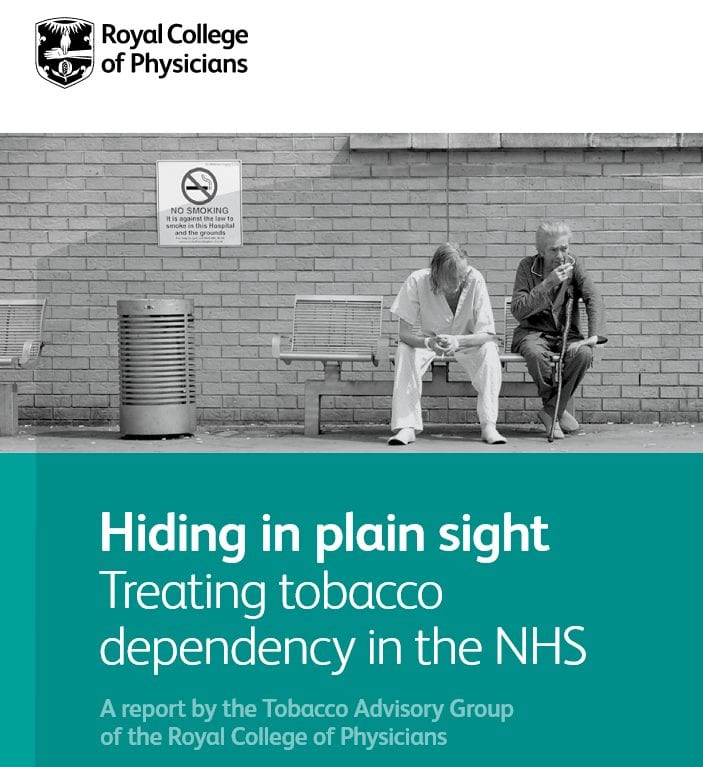
Allowing Patients To Vape Could Save the NHS Billions
The Royal College of Physicians has called for a radical approach on the way doctors deal with smokers and says all NHS sites should become ‘vape friendly’.
In a report released this week the highly respected medical body says not offering smokers admitted to hospital a viable plan to help them quit is as “negligent as not treating cancer.”
Smokers currently cost the cash strapped NHS £1billion plus per year and the report agrees the quit rate among smokers doubles when they receive support and says ALL hospital patients that smoke should receive such help as a matter of course.
The RCP also recognizes the current NHS Stop Smoking Services may not be up to scratch – something I touched on in the piece Smokers Turning Their Backs On Stop Smoking Clinics.
The report says:
Current models of delivering stop smoking services separately from mainstream NHS services, while successful in the past, may now not be the best approach because the patient has to seek help themselves.
But it’s the call for the use of e-cigarettes on all NHS properties that catches the eye in the Hiding in plain sight: Treating tobacco dependency in the NHS report.
I’ve recently spent a week visiting my dad in hospital and whilst there were no ‘Vaping Banned’ signs anywhere to be seen there were plenty of ‘No Smoking’ signs all of which were ignored.
Both patients and visitors were congregating around the main entrance smoking openly by the huge ban signs with the grounds littered with fag butts!
Whilst I agree this is after all open air – the overall impression was not good with one office window displaying the sign ‘please do not smoke near this open window’.
Admittedly there were a number of vapers but not as many as the smokers and indeed one lady was visibly struggling to breathe as she puffed on a roll up.
The NHS Urgently Needs A Uniform Vaping Policy
There’s a number of hospitals in the UK currently operating a total smoking and vaping ban on their grounds – whilst others have banned smoking but created so called ‘vape zones’.
The RCP argues that if the NHS is serious about tackling the dangers of smoking then it should be targeting smokers on admission with e-cigarettes offered as a viable alternative.
However the report states:
- Most health professionals receive little or no training in treating smokers
- The NHS does not collect data on smoking treatment delivery, or have a payment tariff for treating tobacco dependency
- Smoking treatment also tends to be squeezed out, even in the management of diseases caused by smoking, by other, less cost-effective interventions
It’s worrying that not that many NHS medical professionals have any knowledge of smoking cessation methods and more worryingly smoking as the root cause of very many illnesses is ignored whilst apparently the ‘symptoms’ are treated.
Professor John Britton, chair of the RCP’s Tobacco Advisory Group and lead editor of the report, said:
Treating the more than one million smokers who are admitted to hospitals every year represents a unique opportunity for the NHS to improve patients’ lives, while also saving money. For too long the NHS has failed to take responsibility for smoking, while prioritizing other, less effective activity.
Smoking, the biggest avoidable cause of death and disability in the UK, is hiding in plain sight in our hospitals and other NHS services; the NHS must end the neglect of this huge opportunity to improve our nation’s health.
Wise words indeed and it goes without saying opening up NHS sites to allow vaping – considerate vaping that is – would be a step in the right direction.
Dr Sanjay Agrawal, consultant in respiratory and intensive care medicine, University Hospitals of Leicester NHS Trust and a member of the RCP Tobacco Advisory Group, said:
This is an ‘open goal’ for the NHS.
We can save lives and save money by applying simple effective treatments in the same way that we do for millions of other patients – these treatments are very low cost.
The changes would be pretty straightforward to make and we would start reaping the benefits in the first year, taking some of the strain off the NHS.
The changes we have recommended have been tried and tested in the UK and Canada and have made a significant impact, so it’s time to apply this approach across the NHS.






